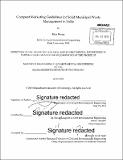Compost marketing guidelines for solid municipal waste management in India
Author(s)
Huang, Ellen, M. Eng. (Ellen C.). Massachusetts Institute of Technology
DownloadFull printable version (7.170Mb)
Other Contributors
Massachusetts Institute of Technology. Department of Civil and Environmental Engineering.
Advisor
David Langseth.
Terms of use
Metadata
Show full item recordAbstract
India has a waste problem. With the world's second largest population at 1.252 billion individuals, a population density of 382 persons per square kilometer and consumer behavior demanding a higher standard of life and preferences for more goods, the Indian municipal waste management systems are struggling to keep up with the increasing amounts of waste coming from households. Composting is a way to divert waste away from landfills and reclaim value by transforming waste into a new product. The Indian Government has accepted the value of compost and has promulgated in 2000 that it is a recognized form of agricultural fertilizer. Due to this legislation, waste recycling start-ups have sprung up but they struggled to make ends meet due to poor market demand. Compost's main competition, chemical fertilizers, are embedded into Indian agricultural practices since the Green Revolution. Additionally, the Indian government subsidizes the chemical fertilizers to promote agriculture at both the small- and industrial-scale. Compost currently does not receive subsidies from the federal level. Thus, companies need to independently develop sustainable business models for compost production and sales if they are to meet government mandates regarding waste management. A key element of such sustainable business models will be the marketing practices, on which this thesis focuses. Keywords: Marketing, Solid Waste Management, Compost, India
Description
Thesis: M. Eng., Massachusetts Institute of Technology, Department of Civil and Environmental Engineering, 2015. Cataloged from PDF version of thesis. Includes bibliographical references (pages 45-49).
Date issued
2015Department
Massachusetts Institute of Technology. Department of Civil and Environmental EngineeringPublisher
Massachusetts Institute of Technology
Keywords
Civil and Environmental Engineering.